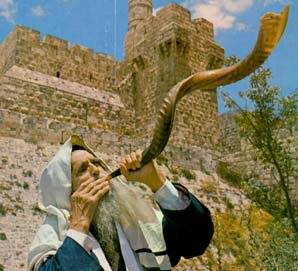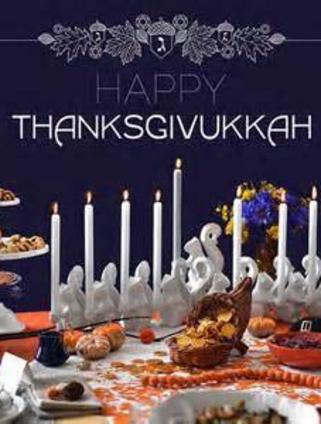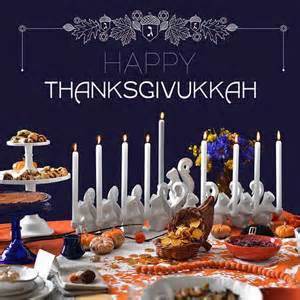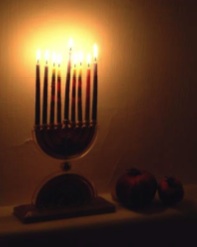A New Tradition is Born
Hanukkah is celebrated for eight days and each day starting at sundown a candle is lit on a menorah that was created just for Hanukkah. The standard menorah has only seven branches to light.
The new menorah has a total of nine branches to light, it is called the Hanukkiah.
Jesus celebrated Hanukkah
Yeshua, (Jesus) did not spend a lot of time in Jerusalem. Most of His ministry is recorded to be around Galilee. He would have made His pilgrimage to Jerusalem on the appointed feast days, such as Passover, Pentecost, The Day of Atonement, The New Year, and the Feast of Tabernacles. He is however found in Jerusalem on the 25th of Kislev to celebrate Hanukkah.
It was on Hanukkah that Yeshua chose to announce His deity. He stood in Solomon’s colonnade and proclaimed to be echad (one) with the Father. He plainly stated that He could grant eternal life.
He had the “chutzpa” to declare that He was God on Hanakkah, the day that was a memorial to the defeat of Antiochus, a self proclaimed god. How dare He? According to the Jews, His pronouncement could not have come at more delicate time.
He was thereafter considered a blasphemer, after claiming His own deity, by many of the religious Jews. They had suspected that He was the Messiah, however, their perspective of Messiah did not included the fact that He was fully man and fully God.
The Jews had surrounded Him and wanted Him to identify Himself as the Messiah. He more or less told them that He had all ready done that, but they did not believe Him anyway. It was here in Solomon’s colonade that Jesus had identified Himself as “the light of the world” earlier during the Feast of Tabernacles.
He was not welcome there in the Temple and they began to stone him for what they perceived to be blasphemy. My point is to recognize that Jesus was in Jerusalem to celebrate Hanukkah, a Jewish tradition, and not a required feast day.
What is the lesson of Hanukkah that we can learn for today?
As our world becomes darker and darker, and the laws of our land have become in direct opposition to the laws of God, we need to guard against assimilation into this world’s system. We like the Maccabee’s need to stand up against unrighteousness, even to the point of losing our lives if necessary.
Even when the odds are against us, if we are on Gods side then we have a majority. The Holy things of God deserve our allegiance and they are to be protected. No one can plunder your temple and take from you the treasure that is hidden there. They can take your life, but your light is eternal.
Jesus is the eternal lamp of the world that will never go out. He is our servant candle who deposits the oil of the Holy Spirit into each heart that believes. He is the one that lights the wick in our hearts and starts an eternal flame. Our hearts are His Temple now and He is always welcome to stay.
During this eight day Hanukkah season let us rededicate our Temple to the “light of the world” and bless God for our sanctification, for all the miracles that He continues to do, and most of all for sustaining us from year to year. I pray that each of us will let our light so shine in this world of darkness, that it will give glory to our Father who is in heaven.
Pray for America!
I exhort therefore, that, first of all, supplications, prayers, intercessions, [and] giving of thanks, be made for all men;
For kings, and for all that are in authority; that we may lead a quiet and peacable life in all godliness and honesty.
For this is good and acceptble in the sight of God our Savior.
Who will have all men to be saved, and to come unto the knowledge of the truth.
For there is one God, and one mediator between God and men, the man Christ Jesus (Yeshua)
1 Timothy 2:1-5
Thank you for reading and be sure to share with friends and family.
If you know of anyone that wants to be on our mailing list. Click Below:
Be Blessed!
Rev. Marjorie
A strange and wonderful event took place this November, that is said, will not happen again for 79,000 years. Hanukkah and Thanksgiving fell on the same day this year. The 25th of Kislev is Hanukkah and because of the Jewish lunar cycle being different from the Solar Gregorian cycle, the 25th of Kislev changes yearly during the months of November and December.
A continual light in the darkness
It is said that if you want to know the end from the beginning, one must go back to the beginning. So if we look to the beginning, we find God commanding Israel to keep a perpetual light burning in the temple.
Exodus 27:20-21 And thou shalt command the children of Israel, that they bring thee pure oil olive beaten for the light, to cause the lamp to burn always. In the tabernacle of the congregation without the vail, which is before the testimony, Aaron and his sons shall order it from evening to morning before the LORD: it shall be a statute for ever unto their generations on the behalf of the children of Israel.
This then is a prophetic picture painted by God of “the Light of the world” residing in a temple not made of hands, i.e. our bodies. Let us therefore let our light so shine that it will give glory to our Father who is in heaven.
Solomon Dedicating the Temple
Now Daniel prophesied about what would precede the Hanukkah that took place around 164 years before the birth of Yeshua.
Daniel 8:3-9 Then I lifted up mine eyes, and saw, and, behold, there stood before the river a ram which had two horns: and the two horns were high; but one was higher than the other, and the higher came up last. (two horns on the ram represents two kingdoms, Media and Persia) I saw the ram pushing westward, and northward, and southward; so that no beasts might stand before him, neither was there any that could deliver out of his hand; but he did according to his will, and became great.
And as I was considering, behold, an he goat (king of Greece Alexander the Great) came from the west on the face of the whole earth, and touched not the ground: and the goat had a notable horn between his eyes. (a great king) And he came to the ram that had two horns, (Media and Persia) which I had seen standing before the river, and ran unto him in the fury of his power. And I saw him come close unto the ram, and he was moved with choler against him, and smote the ram, and brake his two horns: and there was no power in the ram to stand before him, but he cast him down to the ground, and stamped upon him: and there was none that could deliver the ram out of his hand.
Therefore the he goat waxed very great: (Alexander conquered the known world) and when he was strong, the great horn was broken; (he died at the young age of 32 in 323 BC) and for it came up four notable ones toward the four winds of heaven. (Four of Alexander’s generals divided the then known world into four kingdom’s) And out of one of them came forth a little horn, (the little horn has been identified as Antiochus Epipthanes of Syria) which waxed exceeding great, toward the south, and toward the east, and toward the pleasant land. (Israel) Parenthesis is mine for a clearer understanding.
Hanukkah is a Tradition
Although Hanukkah was not one of the required feast days, it has become a tradition. Because one hundred and sixty plus years before the birth of Jesus the temple had been rededicated after it had been desecrated by the evil Emperor Antiochus Epiphanies of Syria. The Temple had been desecrated three years prior to the dedication. Antiochus thinking that he was a living and walking god emptied the Temple in Jerusalem of all its holy treasures and set up an Idol on the altar in the Temple. He brought into the Temple a statute of Greek god Zeus. Zeus was known to be the king of heaven and thunder. Zeus was also known to be very erotic. He was an affront to the religious Jews.
From the book of Maccabees we read:
After Antiochus had defeated Egypt in the year one hundred and fortythree [circa 170 BCE], he returned and went up to Israel and to Jerusalem with a strong force. He insolently invaded the sanctuary and took away the golden altar, the lampstand for the light with all its fixtures, the offering table, the cups and the bowls, the golden censers, the curtain, the crowns, and the golden ornament on the façade of the temple. He stripped off everything, and took away the gold and silver and the precious vessels; he also took all the hidden treasures he could find. Taking all this, he went back to his own country, after he had spoken with great arrogance and shed much blood. And there was great mourning for Israel, in every place where they dwelt. (1 Maccabees 1:20–25)
He further desecrated the Temple by sacrificing a pig on the altar. This evil Emperor set new laws in place that were punishable by death. The Jews were told to worship idols, stop studying the Torah, to give up the observance of the Sabbath and to stop following the commandments. Unfortunately, many Jews chose to assimilate into the culture of the Syrians. Horrific stories are told about this evil time, for instances, mother’s were told not to circumcise their male babies. If a mother went against this edict, the child would be killed and hung around the mother’s neck as punishment. Those Jews that refused to obey the new laws either fled or were put to death.
It took three years for a small band of religious freedom fighters lead by Judah Maccabee to overtake the Syrian army that they were fiercely outnumbered by.
An elderly Levi priest named Mattahias decided to stand up against the mightiest known army of the day. He and his five sons gathered together with many others to fight for their beliefs. Mattahias’ son Judah led this band of freedom fighters after the death of his father. Although they were outnumbered seven to one, they never-the-less, prevailed and defeated the mighty army of Antiochus.
Victorious, the Maccabees went to the Temple to re-light the eternal lamp and to make the Temple holy again. They found however that there was only enough oil to last for one day. The process of making more oil would take eight days. They lit the lamp and went about the business of sanctifying more oil when a miracle took place. The eternal lamp kept burning for the entire eight days until the new oil was ready. The re-dedication of the Temple took place exactly three years to the day from the time that it had been desecrated by Antiochus. From that day forward, the Jews celebrate Hanukkah in memory of the miracle that God did keeping the eternal light burning in the Temple for eight days on one day’s supply.
Sound the Alarm !!!!!
"Blow you the trumpet in Zion,
and sound an alarm in my holy mountain:
let all the inhabitants of the land tremble:
for the day of the LORD comes,
for it is near at hand" Joel 2:1
Headline: Happy ThanksgivingHanukkah
Newsletter
November 30, 2013
Visit http://sweetmanna.org
Sweet Manna Ministries
 | ||||||
 | ||||||






